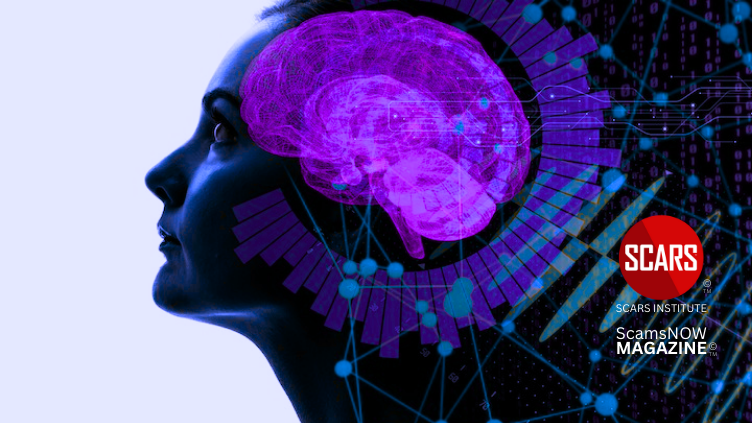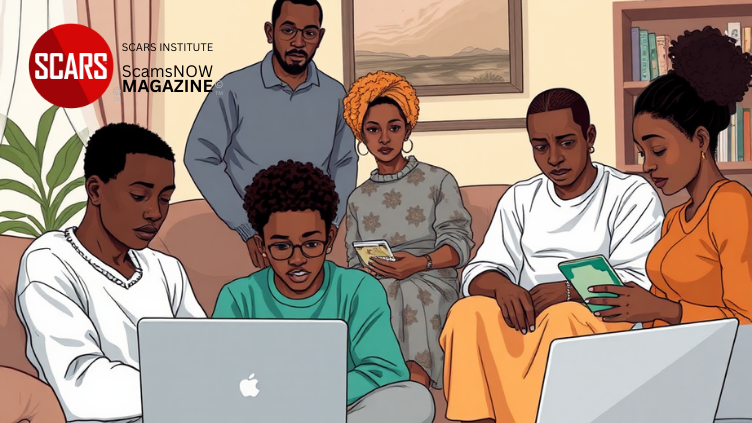61% of Nigeria’s Scammer’s Parents Know Their Children Scam and Are Ok With It
This Demonstrates the Deep Level of Social and Moral Corruption in Nigeria
Primary Category: Criminology
Authors:
• SCARS Editorial Team – Society of Citizens Against Relationship Scams Inc.
• Portions from PM News
About This Article
The discovery that 61% of Nigeria’s scammer’s parents are aware that their children are scammers and their involvement in scams and cybercrime, specifically “Yahoo Yahoo” (internet fraud), exposes a troubling issue of familial complicity.
Many parents may even benefit financially from these illegal activities, raising ethical and legal concerns about their role as accessories after the fact, as outlined in Section 10 of Nigeria’s Criminal Code.
This complicity perpetuates cybercrime, damaging Nigeria’s reputation on a global scale.
Nigeria’s Economic and Financial Crimes Commission (EFCC) highlights the broader societal and international impact of these crimes and stresses the need for comprehensive solutions, including collaboration between agencies. Without concerted action, the future of Nigeria’s youth, families, and its standing in the global community faces significant risks.

61% of Nigerian Parents of Scammers are Aware of Their Children’s Involvement in ‘Yahoo, Yahoo’ Online Scamming
The Nigerian Economic and Financial Crimes Commission (EFCC) said its investigation has revealed that most of the parents of suspects arrested for involvement in cybercrimes, otherwise known as Yahoo Yahoo are aware of their children’s involvement in the crime.
According to the Nigerian Criminal Code: Section 10 of the Criminal Code Act in Nigeria. Accessories after the fact
A person who receives or assists another who is, to his knowledge, guilty of an offence, in order to enable him to escape punishment, is said to become an accessory after the fact to the offence.
Acting EFCC Zonal Director, Lagos Zonal Command of the EFCC, Assistant Commander of the EFCC, ACE1 Michael T. Wetkaz revealed this on Friday September 13th, 2024, during a visit to his office by the Sector Commander, FRSC, Lagos State Sector Command, Corps Commander Patrick Davou.
While soliciting for collaboration of FRSC in the work of fighting fraudulent activities, Wetkaz used the opportunity to decry the disturbing involvement of youths in cybercrimes.
He said: “In the EFCC, our mandate is very wide. Recently, we keep hearing that it is just “Yahoo Yahoo” cases that the EFCC is fighting. But you will be surprised at the damage it does to the country in the comity of nations.
“Now, perpetrators of internet fraud even use people for rituals and have also graduated to doing sextortion. This has become an international disaster, as suicide seems to be the option for the victims abroad.
“But we have recorded good progress in that regard so much so that the international community had to ensure our flags were flown in one of their events”
Continuing, he said: “The reputational damage of cybercrimes is a lot and we are trying to mitigate this and find ways to stop it.”
According to him, the EFCC recently investigated some cases involving 100 people over ‘yahoo yahoo’ scamming.
He added: “We had to do an analysis to diagnose the cause of yahoo yahoo. Statistics showed that 61 percent of their parents were aware; 64 percent were still staying with their parents; 62 percent were sponsoring their parents. So, who do we hold?”
He, therefore, advised that all hands must be on deck to stamp the menace out of our society, adding that “I want us to understand that the future is bleak, if our children pursue a life of yahoo yahoo.”
Wetkas also expressed his gratitude to Davou and his team and also requested the FRSC to offer its shoulders, more than ever before, to the EFCC to lean on, especially in the area of information sharing.
He said: “We can see that you have a robust data base. I know that the FRSC has always been a step ahead with the use of technology. This is highly commendable.
“So, you can also assist us to query certain things and get more information that will be useful to our investigations. We have a lot of exhibit cars. We will therefore be collaborating more with your office.”
Speaking earlier, Davou acknowledged the vital role of the EFCC in checkmating the fraudulent activities of some citizens and foreigners alike.
While highlighting the mandate of the FRSC, which he said included manning the highways and reducing congestion on roads so as to ensure that the economic activities of the country are not affected, he explained that the FRSC had recently developed software to enhance its activities. Additionally, he disclosed the FRSC was willing to render technical aid for the Commission whenever it might be needed.
According to him, “We are saddled with a lot of responsibilities.
“We man the highways to ensure the safety of Nigerians and that properties are protected.
“We ensure our roads are motorable and we reduce congestion on our roads, so the economic activities of the country are not affected.
“We have now come up with an App that enables anyone to easily access information about our activities.
“Safety is a shared responsibility and we have collaborated well with the EFCC, hence our visit today.“
SCARS Institute Analysis
Please Rate This Article
Please Leave Us Your Comment
Also, tell us of any topics we might have missed.
Thank you for your comment. You may receive an email to follow up. We never share your data with marketers.
-/ 30 /-
What do you think about this?
Please share your thoughts in a comment above!
-/ 30 /-
What do you think about this?
Please share your thoughts in a comment above!
ARTICLE RATING
TABLE OF CONTENTS
CATEGORIES
MOST POPULAR COMMENTED ARTICLES
POPULAR ARTICLES
U.S. & Canada Suicide Lifeline 988
![NavyLogo@4x-81[1]](https://scamsnow.com/wp-content/uploads/2025/04/NavyLogo@4x-811.png)
ARTICLE META
WHAT PEOPLE ARE TALKING ABOUT LATEST SITE COMMENTS
See Comments for this Article at the Bottom of the Page
on Arts and Crafts Can Significantly Aid in Recovery for Scam Victims – 2025: “I did not realize that things I like doing very much—knitting or sudoku—were so helpful in my recovery process. The…” Jul 14, 11:28
on Projection And Scam Victims: “The moment I realized I had a financial loss due to a scam I realized that I felt shame, guilt,…” Jul 13, 19:12
on Japanese Legend of Tears – When There Are No Words – 2025: “After discovering the fraud, the pain was enormous. I shed oceans of tears, but I always tried to do it…” Jul 13, 10:50
on The SCARS Institute Scam Victim Recovery Timeline – 2025: “Wow. I umm experienced some of the later curves. I have been bouncing back and forth between asking myself why…” Jul 11, 00:01
on Transference And Emotional Danger After The Scam – 2024: “Thank you for the kind but firm reminder that the person in the stolen profile photo has their own life.…” Jul 9, 01:26
on ‘Mental Defeat’ – The Unique Condition Of Giving Up – 2024: “Thank you for another great article. I can see from this article that mental defeat would be debilitating to a…” Jul 9, 00:49
on Trust: Romance Scams Betrayal And Scam Victims – 2024: “This provided valuable insight that I can identify with” Jul 8, 16:44
on A Scam Victim in Extreme Distress – Stopping the Pain – 2024: “Your trust issues are very understandable. We are very sorry this happened to you. We suggest that you contact an…” Jul 8, 14:42
on A Scam Victim in Extreme Distress – Stopping the Pain – 2024: “My online counselors advised me to check myself in. I went to the hospital because I was suicidal. After I…” Jul 8, 13:44
on Scam Victim Catastrophizing Making Recovery Difficult 2024: “Excellent article on catastrophizing. I can understand how this could take a person down a rabbit warren of never ending…” Jul 8, 12:12
on The Self-Pity Trap & How To Overcome It – 2023 – [UPDATED 2025]: “I am not in the habit of feeling sorry for myself. After the deception, although it was not easy at…” Jul 8, 11:49
on Pride – A Dual Edged Sword For Scam Victims – 2023 [UPDATD 2024]: “Looking back over my life I have seen how pride has impacted me both positively and negatively. However the negative…” Jul 8, 09:08
on The Self-Pity Trap & How To Overcome It – 2023 – [UPDATED 2025]: “I felt self-pity while the enormity of my financial loss washed over me like a tsunami. The self-pity lasted only…” Jul 7, 18:55
on The Uniqueness Of Scam Victims Or Fraud Victims – 2024: “unfortunately all true. It is highly stressful dealing with the aftermath. I am being sued for the money I borrowed…” Jul 6, 12:50
on Scam Victims & Mental Health Blaming – 2023 [UPDATED 2025]: “For most of my life words have defeated me, made me feel insignificant, unwanted, unneeded. For this reason it is…” Jul 5, 13:36
on Substance Abuse Susceptibility And Scam Victims – 2024: “It is understandable how some would feel that alcohol or substance abuse would be helpful in handling their feelings after…” Jul 1, 20:36
on Scam Victims Use Work To Avoid Healing: “The last 6 years have been the most difficult of my life. The pandemic, having both parents in the hospital…” Jun 29, 18:38
on Entitlement Mentality And How Scam Victims Often Lose Their Path To Recovery – 2024: “Thank you for this discussion of entitlement. I can see from the descriptions listed that I have not felt entitlement.…” Jun 29, 18:22
on Samurai Wisdom and Rituals for Clearing the Mind After Scam Trauma – 2025 – [VIDEOS]: “A great guide on how to move forward in our recovery process with a calm mind, cleansed on an ongoing…” Jun 28, 07:34
Important Information for New Scam Victims
Please visit www.ScamVictimsSupport.org – a SCARS Website for New Scam Victims & Sextortion Victims
SCARS Institute now offers a free recovery program at www.SCARSeducation.org
Please visit www.ScamPsychology.org – to more fully understand the psychological concepts involved in scams and scam victim recovery
If you are looking for local trauma counselors, please visit counseling.AgainstScams.org
If you need to speak with someone now, you can dial 988 or find phone numbers for crisis hotlines all around the world here: www.opencounseling.com/suicide-hotlines
Statement About Victim Blaming
Some of our articles discuss various aspects of victims. This is both about better understanding victims (the science of victimology) and their behaviors and psychology. This helps us to educate victims/survivors about why these crimes happened and not to blame themselves, better develop recovery programs, and help victims avoid scams in the future. At times, this may sound like blaming the victim, but it does not blame scam victims; we are simply explaining the hows and whys of the experience victims have.
These articles, about the Psychology of Scams or Victim Psychology – meaning that all humans have psychological or cognitive characteristics in common that can either be exploited or work against us – help us all to understand the unique challenges victims face before, during, and after scams, fraud, or cybercrimes. These sometimes talk about some of the vulnerabilities the scammers exploit. Victims rarely have control of them or are even aware of them, until something like a scam happens, and then they can learn how their mind works and how to overcome these mechanisms.
Articles like these help victims and others understand these processes and how to help prevent them from being exploited again or to help them recover more easily by understanding their post-scam behaviors. Learn more about the Psychology of Scams at www.ScamPsychology.org
SCARS INSTITUTE RESOURCES:
If You Have Been Victimized By A Scam Or Cybercrime
♦ If you are a victim of scams, go to www.ScamVictimsSupport.org for real knowledge and help
♦ Enroll in SCARS Scam Survivor’s School now at www.SCARSeducation.org
♦ To report criminals, visit https://reporting.AgainstScams.org – we will NEVER give your data to money recovery companies like some do!
♦ Follow us and find our podcasts, webinars, and helpful videos on YouTube: https://www.youtube.com/@RomancescamsNowcom
♦ Learn about the Psychology of Scams at www.ScamPsychology.org
♦ Dig deeper into the reality of scams, fraud, and cybercrime at www.ScamsNOW.com and www.RomanceScamsNOW.com
♦ Scam Survivor’s Stories: www.ScamSurvivorStories.org
♦ For Scam Victim Advocates visit www.ScamVictimsAdvocates.org
♦ See more scammer photos on www.ScammerPhotos.com
You can also find the SCARS Institute on Facebook, Instagram, X, LinkedIn, and TruthSocial
Psychology Disclaimer:
All articles about psychology and the human brain on this website are for information & education only
The information provided in this and other SCARS articles are intended for educational and self-help purposes only and should not be construed as a substitute for professional therapy or counseling.
Note about Mindfulness: Mindfulness practices have the potential to create psychological distress for some individuals. Please consult a mental health professional or experienced meditation instructor for guidance should you encounter difficulties.
While any self-help techniques outlined herein may be beneficial for scam victims seeking to recover from their experience and move towards recovery, it is important to consult with a qualified mental health professional before initiating any course of action. Each individual’s experience and needs are unique, and what works for one person may not be suitable for another.
Additionally, any approach may not be appropriate for individuals with certain pre-existing mental health conditions or trauma histories. It is advisable to seek guidance from a licensed therapist or counselor who can provide personalized support, guidance, and treatment tailored to your specific needs.
If you are experiencing significant distress or emotional difficulties related to a scam or other traumatic event, please consult your doctor or mental health provider for appropriate care and support.
Also read our SCARS Institute Statement about Professional Care for Scam Victims – click here
If you are in crisis, feeling desperate, or in despair, please call 988 or your local crisis hotline.
More ScamsNOW.com Articles
A Question of Trust
At the SCARS Institute, we invite you to do your own research on the topics we speak about and publish. Our team investigates the subject being discussed, especially when it comes to understanding the scam victims-survivors’ experience. You can do Google searches, but in many cases, you will have to wade through scientific papers and studies. However, remember that biases and perspectives matter and influence the outcome. Regardless, we encourage you to explore these topics as thoroughly as you can for your own awareness.















![scars-institute[1]](https://scamsnow.com/wp-content/uploads/2025/04/scars-institute1.png)
![niprc1.png1_-150×1501-1[1]](https://scamsnow.com/wp-content/uploads/2025/04/niprc1.png1_-150x1501-11.webp)

Leave a Reply